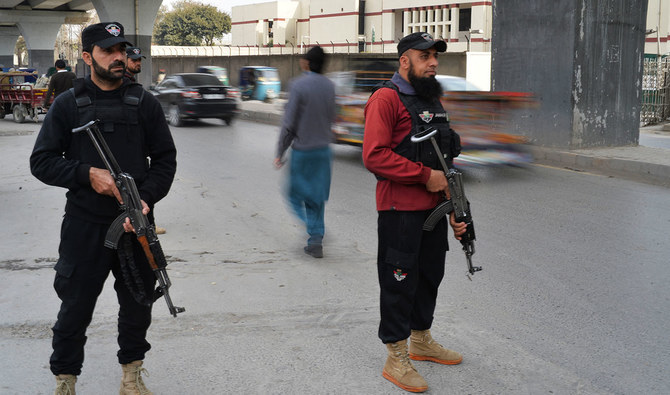PESHAWAR: The administration of Pakistan’s northwestern Peshawar district on Monday placed a ban on processions and public gatherings for a period of one week, citing security reasons amid a sharp surge in militant violence in and around the area since the beginning of the year.
The decision comes at a time when political actors across the country are gearing up for election activities ahead of the national polls scheduled in February.
Peshawar witnessed a deadly suicide attack targeting a mosque in a police compound during a prayer congregation earlier this year in January that claimed the lives of nearly 100 people.
A notification issued by the office of the deputy commissioner said the security situation in the area came under consideration during the latest meeting of the District Intelligence Coordination Committee in which the law enforcement agencies shared their threat assessment.
“There exist substantive threats of miscreants targeting the processions, public gatherings (social and political) etc. which might not only result in loss of precious lives but would also create a law and order situation in District Peshawar,” it said.
Speaking to Arab News, Peshawar’s deputy commissioner Abid Wazir said the ban on public gatherings was imposed to “prevent any untoward incident in the city.”
“The situation in Peshawar and its surrounding areas is not normal and an operation against militants has been carried out in the nearby Tirah Valley [located in the Khyber district],” he said, adding that several militant attacks had also been carried out in the Hassan Khel tehsil of Peshawar.
However, political analysts maintained the situation in the city was not entirely volatile, saying it was widely believed the ban was imposed to stop former prime minister Imran Khan’s Pakistan Tehreek-e-Insaf (PTI) party from carrying out planned political activities.
“The aim of the ban is to stop PTI from holding a workers’ convention in Peshawar on November 24,” journalist and political analyst Lehaz Ali told Arab News.
He said it was strange that some political factions, such as Jamiat-e-Ulama-e-Islam-Fazl (JUI-F) and Pakistan Peoples Party (PPP), were allowed to conduct their conventions within the same context.
“Similar bans may also be imposed in other places by the authorities while dealing with Khan’s party,” he added.
The PTI ruled the northwestern Khyber Pakhtunkhwa (KP) province for nearly two terms after the party was elected in the 2013 elections. It also formed the government in the province following its success in the 2018 polls.
However, Khan, whose administration in Islamabad was driven out of power in a parliamentary no-confidence vote in April 2022, dissolved the KP assembly earlier this year to mount pressure on the government to hold early elections.
The former prime minister witnessed an intense crackdown against his party after he was briefly detained by the authorities on graft charges in May, prompting his supporters to resort to violent protests and vandalize government and military installations in response.
Many PTI leaders, including Khan, faced serious legal charges and were arrested in the wake of the development.
The party has since been calling for a “level playing field” to carry out election activities, expressing fears that attempts are made to eliminate it from the political landscape of the country.
Mehmood Jan Babar, a political and security analyst, also told Arab News the notification was primarily issued to prevent the PTI from carrying out election campaign.
“It is a known fact that the order is PTI-specific to prevent its workers’ convention on November 24,” he said.
Babar pointed out that militants had made threats against several political parties, such as the Awami National Party and the PPP, in the past and even carried out attacks against their leaders.
Yet, this did not stop them from carrying out election campaigns.
“PTI’s confrontation is directly with the Pakistani state now,” he continued. “I feel the troubles created for them in the upcoming elections will also be from Pakistani government’s side.”
Peshawar’s commissioner and deputy commissioner did not respond to Arab News when asked if the ban was imposed to hinder PTI’s political activities.












